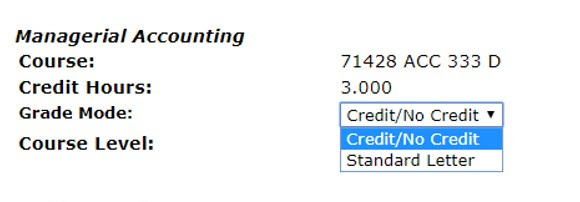Grades can be a major source of stress, even under normal circumstances.
This semester, the sudden transition to online classes has led to wide-scale changes in grading policies that have created even more stress and uncertainty than usual.
Whether your student is happy with the updates or stressed about how the changes will affect them, here are some steps they can take now to make sure they’re navigating the situation as effectively as possible.
Check for Updates
New policies are being released on a daily basis, so it’s important to make sure students are checking frequently for updates from their school district, their school administrators, and their individual teachers.
These changes can vary dramatically depending on your student’s state, school, and grade level. Here are some examples of grading policy updates we have seen middle schools, high schools, and colleges announce that you may want to look out for…

District-wide and School-wide announcements:
- Eliminating end-of-course exams
- Switching all classes from Graded to Pass/Fail
- Treating all online coursework as optional
- Only counting online assignments that improve a student’s average
- Weighting online coursework less heavily than work from before the shutdown
- Preventing course grades from dropping more than 5% from where they were when in-person classes concluded
- Giving students either the grade they had before the shutdown, or the grade they have at the end of the semester with their online coursework…whichever is higher
- Extending deadlines for students to change grading options to Withdraw, take an Incomplete, or switch to Pass/Fail or Credit/No Credit
Teacher-specific changes:
- Changing due dates for major assignments and exams
- Reducing or removing penalties for late work
- Changing the relative weight of different course components
(for example, reducing participation from 20% to 10% weight) - Changing test formats (making exams open-note, short-answer, etc.)
- Eliminating tests, or changing them to projects or papers
- Changing how assignments are graded (for completion vs. accuracy)
- Eliminating or changing the formats for class discussions, assignments, projects, and/or exams
- Giving more opportunities for extra credit
Many teachers are posting an updated syllabus or sending out emails or announcements about these changes in their policies, so it’s important for students to make sure they’ve reviewed all of this information thoroughly and understand all of the updates that have been made to the policies in each of their classes.
Find out Where you Stand
Depending on the policies your student’s school and teachers have announced, do your best to calculate your teen’s grades and find out where they stand. If there is any uncertainty about what their grades will be, consider reaching out to their teacher or school counselor to get confirmation in writing – at least via email – to make sure you know what their current grade is and how it will be calculated moving forward.
Plan how to respond
With the wide range of different policies schools and teachers are adopting, and more updates coming out on a daily basis, it can be challenging for students to know how to respond. While the ideal response will differ depending on the specific information they’ve received from their district, school, and teacher, here are some general guidelines that may be helpful to consider…
If your student’s school is continuing to assign work and they are hoping to maintain or improve their grades before the end of the semester, keep in mind that with all of the challenges students are facing with the transition to online school, teachers are doing their best to be understanding and accommodating. So, even students who do not typically communicate with their teachers outside of class should consider reaching out to ask for help in whatever way is easiest for them, whether that is by email, Remind, or office hours online. Communicating proactively and keeping the lines of communication open will show teachers that your student is taking their class seriously and ensure they have the support and guidance they need to succeed.

If your student is in college and has the option to change their course options by withdrawing, taking an incomplete, or switching to Pass/Fail or Credit/No Credit, make sure they read through all of the available information about these decisions and consider any implications these choices will have for their overall GPA, prerequisites, and graduation requirements. If they are considering transferring schools or applying for admission to graduate and/or professional school programs in the future, make sure they are also researching and considering the policies of the schools to which they’ll be applying before making their final decision about these chances.
Students whose schools have made online schoolwork optional or switched all classes to Pass/Fail may be feeling especially unmotivated or frustrated with school, especially if they were doing well in their classes before the shutdown. However, just because they are not being graded on their schoolwork doesn’t mean that nothing they are doing right now is important.
Students can still maintain a sense of meaning and purpose by focusing on what is in their control. And there is still a lot they can do to make the most of this time…whether that is by studying for AP exams, completing optional coursework for teachers they are planning to ask for letters of recommendation, researching potential colleges or careers, investing time into a hobby or passion, or finding ways to volunteer and help out their family and community during this time of need, there are lots of things they can do to make the most of the time they have.
Keep in mind…
No matter how their school and teachers handle the shutdown, your student still has the power to choose how they are going to respond!
As long as they keep checking for updates, stay in touch with their teachers, complete any work they’re assigned, and make the most of their time, they will be able to look back with confidence and know that no matter what else was going on in the world, at least they did their best.

Join 11,000+ parents helping their students earn better grades with less stress!

About The Author
Dr. Maggie Wray is a certified ADHD Coach & Academic Life Coach with a Ph.D. in Neurobiology and Behavior from Cornell and a Bachelor’s degree in Astrophysics from Princeton. She founded Creating Positive Futures in 2012 to help high school and college students learn how to earn better grades with less stress. Her team of dedicated coaches is on a mission to empower students to develop the mindset, organization, time management, and study skills they need to achieve their goals.
Related Posts
Other Posts You May Enjoy
How Does Your Teen Handle Failure?
How do you feel about failure?Most of us aren’t crazy about it. But at some point, no matter how hard we try, we’re going to fail at something. So, it’s important to consider how to respond to failure when it does happen, and how to improve our resilience so we’re...
Optimistic students earn better grades
Is your student more of an optimist, or a pessimist? Studies have shown that optimists experience a number of benefits later in life, as compared with their more pessimistic peers, including… Better test scores and higher GPAs Lower levels of stress, anxiety, and...
Starting before you’re motivated
Most students want to do well in school. But wanting to do well doesn't guarantee they will feel motivated to work on assignments in the moment. Even students who usually get good grades have days when they just don’t feel like doing homework or studying for their...




